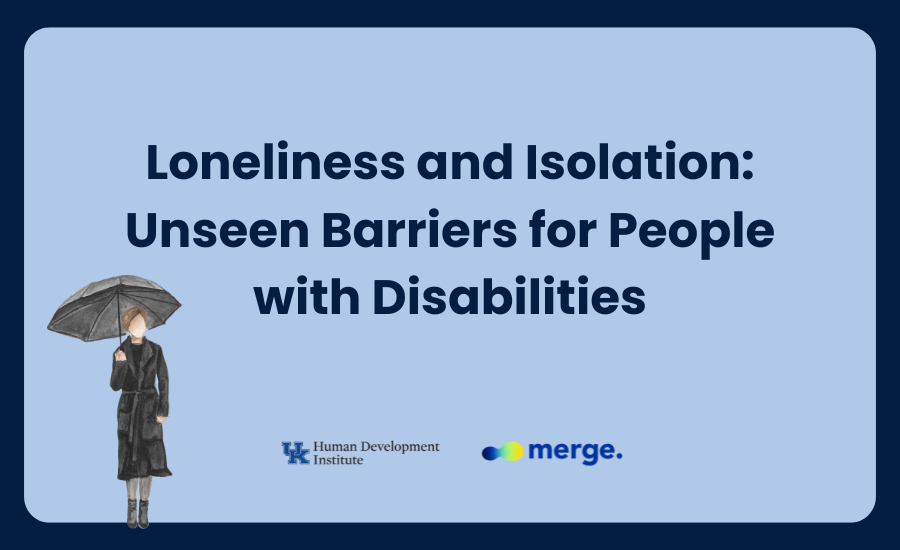Just like anyone else, people with disabilities experience mental health conditions like anxiety and depression, as well as feelings of loneliness and isolation. Merge, an HDI project focused on mental health, interviewed people with disabilities and mental health conditions across Kentucky to learn more about their experiences.
People with disabilities get stressed about everyday life, their jobs, paying their bills, and meeting deadlines. An inclusive mental health provider focuses on the health and well-being of the whole person, not just their experience with their disability.
![“People assume because you have a disability that you’re automatically depressed about [having] a disability, when really you may be depressed about other ‘normal’ things, like life, a job, your household, and money that have nothing to do with your disability. People struggle to understand people with disabilities have other things going on besides dealing with their disability.”](https://hdi.uky.edu/merge/wp-content/uploads/2024/11/1.png)
During the interviews, one of the most consistently reported mental health concerns was loneliness, often exacerbated by social isolation. Social isolation is a lack of contact with community, relationships, and other social supports. Loneliness is the emotional distress someone feels when their social relationships lack their desired quality or quantity.
Loneliness and social isolation have negative effects on both mental and physical health, including anxiety, sleep problems, and increased dementia. People with disabilities experience higher rates of loneliness and social isolation than people without disabilities and are at risk of physical and mental health impacts.
One Merge interviewee who lives in a long-term care facility feels a lack of support in her mental health journey while also feeling like she has little privacy. After her relationship with her family was damaged, she lost a majority of her social life. Because of that loss, she wanted to be more involved in her community, but transportation and the need of a direct support person is a significant obstacle as she can’t stay out on her own for longer than a few hours.

Another interviewee discussed his experience as a disability rights advocate in the 1980s and being institutionalized as a child. This person now lives independently; however, he often feels isolated. His caretaker frequently refuses to meet his needs or provide transportation to advocacy groups and mingle nights, both of which he notes are much-needed solutions for his loneliness and isolation. While he believes a vacation would be beneficial to his mental health, he says the waiver he’s on doesn’t provide enough money for him to do so.
Many others reported similar experiences and indicated loneliness and isolation damaged their mental health. Meanwhile, others reported when they had more positive social connections, particularly with those who understood their struggles, it had a positive impact on their physical and mental health.

One interviewee mentioned he had a teacher with similar disabilities to himself who helped him a lot. Another mentioned their involvement with a community group for transgender people greatly improved their mental health. They also mentioned friends and mentors as another important part of their social support system.
Improving social determinants of health, or the conditions in the environments where we are born, live, work, and play affects our health and quality-of-life. Feeling a sense of personal well-being increases life satisfaction, sense of meaning and belonging, and social connectedness.

Everyone faces challenges related to mental health; however, people with disabilities’ mental health is often compounded by social isolation and loneliness. The experiences shared through Merge interviews highlight the need for inclusive, whole-person mental health care that addresses the full range of life experiences.
Support systems, including mental health and other providers, friends, mentors, and community involvement significantly improves mental well-being. Addressing social determinants of health, such as access to community and relationships, is essential for fostering a sense of belonging and personal fulfillment.



